
Gastric bypass surgery Turkey Istanbul, gastric bypass surgery cost in Turkey, gastric bypass surgery Turkey price, How much does gastric bypass surgery cost in Turkey? Gastric bypass surgery has emerged as a prominent solution for weight loss, particularly in Istanbul, Turkey. This procedure skillfully combines aspects of both restrictive and malabsorptive surgeries to effectively alter the digestive process. By creating a small upper pouch within the stomach and connecting the small intestine to this newly formed section, the surgery ensures that food bypasses the larger stomach remnant. Consequently, the stomach’s holding capacity is significantly reduced, leading to a decrease in calorie intake. Furthermore, this reconfiguration of the intestine curtails the absorption of nutrients, thereby employing a dual approach to weight management.
The innovative laparoscopic technique utilized for this surgery offers a less invasive alternative, typically taking no more than an hour under general anesthesia. Patients often report a swift and less painful recovery due to the absence of deep skin incisions. The effectiveness of gastric bypass in Istanbul is well-documented, with numerous success stories captured in before-and-after photographs. These narratives not only highlight the transformative physical changes but also underscore the emotional and psychological benefits that accompany significant weight loss. Consequently, the city has become a hub for individuals seeking this life-altering procedure, providing both advanced medical expertise and a supportive environment for patients on their journey to wellness.
Gastric bypass surgery is a type of weight loss surgery that involves creating a small pouch from the stomach and connecting it directly to the small intestine. It bypasses most of your stomach and the first section of your small intestine, reducing your food intake and calories. It can help you lose excess weight and improve health problems related to being overweight, such as heart disease, diabetes, sleep apnea and more.
Gastric bypass surgery is usually performed on patients who have a body mass index (BMI) of 40 or higher, or 35 or higher with obesity-related health problems. It is also an option for patients who cannot lose weight with diet and exercise, or who are not eligible for other types of bariatric surgery.
Gastric bypass surgery is performed laparoscopically, which means that the surgeon makes small incisions in the abdomen and inserts a camera and surgical instruments. The surgeon then staples and cuts off about 80% of the stomach, leaving a banana-shaped pouch. The surgery takes about an hour and requires general anesthesia.
Gastric bypass surgery has many benefits, such as:
• It can help patients lose 50% to 70% of their excess weight within a year.
• It can improve or resolve obesity-related conditions, such as diabetes, high blood pressure, sleep apnea, and joint pain.
• It can enhance the quality of life and self-esteem of patients.
• It can reduce the risk of heart disease, stroke, and some cancers.
Gastric Bypass Surgery Turkey
Gastric bypass surgery cost varies depending on the country, the experience of the surgeon, the standards and location of the hospital, the quality of the medical supplies, and the individual needs of the patient.
Turkey is one of the most preferred destinations for gastric bypass surgery, because:
• It has highly qualified and experienced bariatric surgeons who have international accreditations and certifications.
• It has modern and well-equipped hospitals that have Joint Commission International (JCI) accreditation and follow international standards of excellence.
• It offers affordable and all-inclusive packages that cover all the medical and non-medical expenses of the patient.
• It has a rich and diverse culture, history, and nature that can make the patient’s stay more enjoyable and relaxing.
One of the key benefits of undergoing gastric bypass surgery in Turkey is the cost. The procedure is often much more affordable in Turkey than in many other countries, making it an attractive option for individuals who may not have the financial means to undergo the surgery in their home country. Despite the lower cost, patients can still expect to receive top-notch medical care and have access to modern facilities and technology.
Another advantage of choosing Istanbul for gastric bypass surgery is the high standard of medical professionals. Turkish doctors are highly trained and often have extensive experience in performing weight loss surgeries. Many hospitals and clinics in Istanbul also have English-speaking staff, making it easier for international patients to communicate with their healthcare providers.
In addition to the quality of care and affordability, Istanbul offers a unique opportunity for patients to explore a new culture and environment while undergoing treatment. Patients can take advantage of their time in Turkey to experience the city’s rich history, vibrant atmosphere, and delicious cuisine.
Before undergoing gastric bypass surgery Turkey, it is important for patients to thoroughly research and choose a reputable hospital or clinic. It is also essential to consult with a qualified healthcare provider to determine if gastric bypass surgery is the right option and to understand the potential risks and benefits.
| Gastric Bypass Surgery in Turkey Brief Details | |
|---|---|
| Length of procedure: | 2 hours |
| Recovery period: | 1 month |
| Complications: | Bleeding, Leakage |
| Exercise: | First month only walking, after 1 month patient can start swimming, going to gym. |
| Risks: | Complications & Death |
| Stay: | 4 Days Hospital, 3 Days Hotel |
| Scars: | 5 incision in total |
| Pain: | Average |
| Potential candidate: | Who has more than 35 BMI. |
| Results: | “We expect from our patient;10% In 1st month, 20% In 3 months, 30% In 6 months, 40% in 1st year of patient’s current weight with gastric surgery” |
| Best Age for Surgery | Between 18-55 |
Types Of Gastric Bypass Surgery
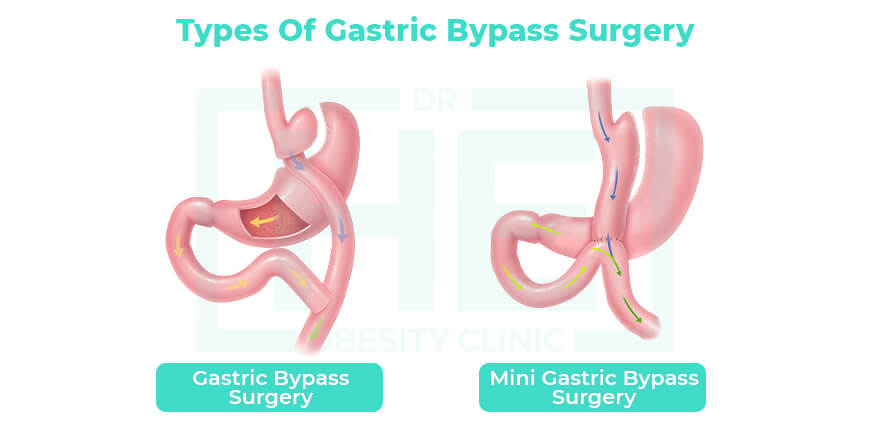
In Turkey, the pursuit of weight loss through surgery includes three main types of gastric bypass procedures. The Roux-en-Y is a technique that creates a small stomach pouch and reroutes the small intestine. The mini gastric bypass simplifies this by attaching the intestine further down, leading to quicker operations and potentially faster recovery. Lastly, sleeve gastrectomy, while not a bypass, reduces stomach size significantly, acting as an effective weight loss surgery. Each method necessitates a commitment to lifestyle changes post-surgery for optimal outcomes.
Roux-en-Y Gastric Bypass
In the realm of bariatric surgery, the Roux-en-Y gastric bypass stands out as a highly sought-after procedure for those battling severe obesity and its related health complications. This surgery involves the construction of a small pouch from the upper segment of the stomach, which is then meticulously attached to the small intestine. As a result, the pathway of the ingested food is rerouted, bypassing a significant portion of the stomach and intestine. Such a redesign of the digestive tract significantly curtails the volume of food that one can consume and the calories absorbed.
The decision to undergo gastric bypass typically follows the realization that conventional weight loss methods have failed to yield desired outcomes. The surgery is not only a response to obesity but also a proactive measure against a spectrum of weight-induced conditions that pose serious health risks. These include:
- Gastroesophageal reflux disease
- Heart disease
- Hypertension
- Elevated cholesterol levels
- Obstructive sleep apnea
- Type 2 diabetes
- Increased risk of stroke
- Certain types of cancer
- Infertility
Candidates for gastric bypass often have a body mass index that exceeds the threshold of extreme obesity, or they suffer from obesity-related illnesses that necessitate surgical intervention. Nonetheless, the eligibility for this surgery extends beyond mere numerical values of BMI. It requires a comprehensive evaluation to determine if an individual meets the medical criteria.
Additionally, a commitment to a transformed lifestyle is imperative, as post-operative success hinges on sustained dietary and behavioral modifications. Insurance coverage for gastric bypass varies, necessitating consultations with healthcare providers to ensure financial feasibility. The journey through gastric bypass is a testament to the complexity of treating obesity, reflecting a confluence of medical, psychological, and socioeconomic factors.
Mini Gastric Bypass
The landscape of bariatric surgery has been reshaped with the advent of the mini-gastric bypass, a technique refined over the recent decade. This surgery, gaining traction for its efficiency and simplicity, has seen a surge in its application within a university hospital setting. Characterized by the creation of a small gastric pouch, the operation integrates a gastroenteric anastomosis strategically placed in the pre-colic isoperistaltic loop.
Key elements of the mini-gastric bypass include:
- A gastric pouch measuring approximately 15-18 cm, with a capacity between 50-150 ml.
- An anastomosis located 200 cm from the duodenojejunal angle, forming the biliopancreatic loop.
The university hospital’s ongoing prospective trial has yielded promising early outcomes. A cohort of seventeen patients has been treated, with none requiring a conversion to an open surgical method. Impressively, the postoperative morbidity within 30 days stood at a mere 5.9%, translating to a single instance of intestinal obstruction due to adhesions. Moreover, the procedure boasts a zero mortality rate, underscoring its safety.
The mini-gastric bypass not only minimizes operative trauma but also expedites recovery, reflected in the absence of long-term complications thus far. This operation offers a beacon of hope for those battling obesity, offering a minimally invasive route to substantial weight loss. The university hospital continues to monitor the long-term efficacy of this technique, anticipating it to be a cornerstone in the field of bariatric surgery. The mini-gastric bypass, thus, stands as a testament to the evolving nature of surgical weight loss solutions.
Sleeve Gastrectomy
Sleeve gastrectomy stands as a surgical beacon of hope for those grappling with obesity. In the bustling medical landscape, this procedure is executed through laparoscopy, which demands precision as the surgeon crafts a stomach resembling a slender banana by removing approximately 80% of its original capacity. This significant reduction in size serves as a physical barrier to overeating, naturally curbing calorie intake. Furthermore, the surgery invokes hormonal alterations, fostering weight loss and mitigating obesity-related ailments.
Notably, sleeve gastrectomy is not a primary option but a recourse when diet and exercise fail to yield results. The surgery’s candidacy criteria are stringent, ensuring patients are selected through a lens of potential benefit versus risk. Individuals with a body mass index (BMI) of 40 or higher find themselves eligible, as do those with a BMI between 35 and 39.9 if they endure severe weight-related health issues. The procedure is also available to patients with a BMI of 30 to 34 facing serious health complications due to their weight.
Undergoing sleeve gastrectomy signals the beginning of a lifelong commitment to health. Post-operation, patients must adhere to a structured follow-up regime that encompasses:
Nutritional guidance to ensure a balanced diet.
Lifestyle coaching to incorporate regular physical activity.
Behavioral counseling to support emotional well-being.
Medical oversight to monitor and manage any associated conditions.
This comprehensive approach ensures the enduring success of sleeve gastrectomy, enabling patients to reclaim control over their health and embark on a journey toward sustainable well-being.
Gastric Bypass Before&After Photos










Who Is Eligible For Gastric Bypass Surgery?
Eligibility for gastric bypass surgery encompasses a specific demographic of individuals struggling with obesity. This surgical intervention is often the recourse for those who have tirelessly pursued weight loss through conventional diets but to no avail. Typically, candidates for this procedure have a body mass index that exceeds 35, indicating a high level of excess weight that could potentially jeopardize their health. Moreover, gastric bypass stands as an option for individuals aged between 18 and 65, encompassing a wide spectrum of adults in need of medical intervention for weight management.
In addition to the BMI threshold, the presence of obesity-related health conditions further qualifies individuals for this surgery. These conditions include but are not limited to:
- Insulin resistance which can lead to type 2 diabetes.
- Sleep apnea that disrupts normal sleep patterns.
- Heart diseases that are exacerbated by obesity.
- Joint disorders where the excess weight imposes additional strain.
Moreover, gastric bypass serves as a secondary measure for patients who have not sustained weight loss from previous bariatric procedures such as sleeve gastrectomy, gastric plication, or gastric banding. This revision surgery offers a renewed opportunity for individuals to achieve and maintain a healthier weight. As such, gastric bypass in Istanbul has become a beacon of hope, offering a path to improved health for many who have struggled with the pervasive challenge of obesity. With each successful surgery, the city cements its reputation as a center of excellence for bariatric surgery, changing lives one patient at a time.
What Are The Advantages Of Gastric Bypass Surgery?
Gastric bypass surgery stands as a formidable intervention for those grappling with obesity, providing a path to sustained weight management. The design of the surgery inherently curtails the quantity of food intake by shrinking the stomach’s capacity, thereby diminishing appetite. This enforced moderation in eating habits facilitates significant weight loss, which patients typically sustain over the long haul. Moreover, the procedure has a profound impact on obesity-related health issues. It is particularly effective in addressing type 2 diabetes mellitus, often leading to its remission.
Advantages of Gastric Bypass Surgery:
- Enduring weight loss: Individuals often experience a marked reduction in weight that persists over time.
- Health improvements: There is a notable decrease in obesity-related complications, improving overall health.
- Psychological benefits: Patients report enhanced mental well-being as a result of their weight loss.
- Physical wellness: The surgery’s effects extend to physical health, with many experiencing greater mobility and stamina.
Patients undergoing gastric bypass typically express high levels of satisfaction with the outcomes, not only in the visible changes to their physique but also in the less tangible psychological improvements. The surgery’s ability to improve overall quality of life is evident in the positive feedback from those who have undergone the procedure. These benefits collectively contribute to the reputation of gastric bypass as a valuable option for weight loss and health enhancement. As such, the surgery is recognized not only for its immediate impact but also for its role in fostering a healthier, more active lifestyle for individuals who have struggled with weight control.
Different complications you should be aware of:
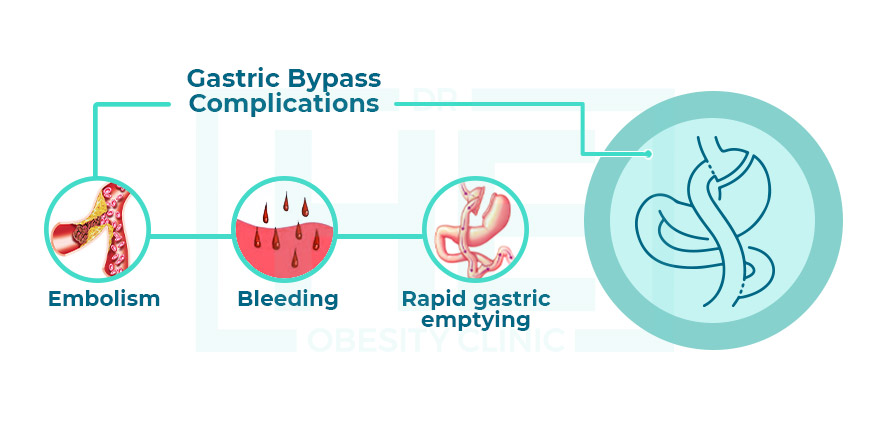
Different complications you should be aware of:
- Embolism:
Gastric bypass, a renowned bariatric surgery, is known for its potential in weight reduction. While it brings transformative results, it also brings a heightened risk of embolism, a concern for patients with excessive weight. Such surgical interventions, regardless of type, inherently carry this risk. Yet, specific precautions are taken to mitigate these dangers.
In the aftermath of gastric bypass, the implementation of safety measures is critical. Patients are equipped with compression stockings, a vital tool in the prevention of venous thromboembolism. These stockings apply steady pressure to the legs, enhancing blood flow and reducing the chance of clot formation. Alongside this, the administration of anticoagulant injections plays a pivotal role. For a span of ten days following their release from medical care, patients continue this regimen at home. These injections thin the blood, further decreasing the likelihood of an embolism.
Moreover, these practices underscore the importance of postoperative care in bariatric surgery. They serve not only as a means of prevention but also as a demonstration of the comprehensive approach to patient health and safety. The combination of mechanical and pharmacological strategies provides a robust defense against the potential complications associated with gastric bypass. Therefore, while the risk remains, the diligent application of these methods ensures that it is kept at bay, allowing patients to focus on their recovery and the journey towards a healthier life.
- Bleeding:
Bleeding stands as the primary complication encountered following gastric bypass surgery. It manifests through a constellation of symptoms including persistent fatigue, episodes of dizziness, and notably diminished blood pressure. Such indicators necessitate prompt medical attention to mitigate potential risks. The standard response to this complication involves the administration of blood transfusions. The volume of blood transfused directly corresponds to the severity of the bleeding, ensuring a tailored approach to patient care.
Moreover, the procedure for addressing postoperative bleeding is streamlined to enhance patient recovery. It is important to note the following key points:
- Medical professionals are equipped with the expertise to swiftly detect the signs of hemorrhage.
- The availability of blood for transfusions is ensured, facilitating immediate response.
- Postoperative monitoring is intensified to catch any signs of bleeding early.
Furthermore, the prognosis for patients experiencing this complication is generally positive. With the efficient protocols in place, the resolution of bleeding episodes is achieved with minimal long-term impact on the patient’s health. Recovery from such an event is bolstered by the supportive care regimen that follows the initial treatment. Thus, while bleeding is a recognized risk of gastric bypass surgery, the comprehensive strategies employed by medical teams in Istanbul render it a manageable challenge. This ensures that patients can continue their journey toward improved health and well-being with confidence, supported by a healthcare system prepared to address such post-surgical concerns effectively.
- Rapid gastric emptying:
Rapid gastric emptying, known colloquially as Dumping Syndrome, stands as a potential complication following gastric bypass surgery. This condition arises when food, especially sugar, swiftly moves from the stomach into the small intestine, prompting a range of uncomfortable symptoms. Individuals may experience abdominal discomfort, cramps, and diarrhea, typically within the first half-hour post-meal. These symptoms are the body’s reaction to the sudden influx of sugary foods into the small intestine, which can be distressing for patients.
To mitigate the risk of Dumping Syndrome, it is advisable for patients to adopt a modified dietary regimen. This involves consuming meals in smaller quantities and eliminating high-sugar foods, which are known to exacerbate the condition. Moreover, it is essential for patients to adhere to a schedule of regular blood tests post-surgery. These tests serve as a critical tool for monitoring any nutritional deficiencies that might arise due to altered food absorption rates.
Patients are encouraged to:
- Eat smaller, more frequent meals to ease digestion.
- Avoid sugary foods that can trigger symptoms.
- Include protein in their diet to enhance satiety and nutritional balance.
Lastly, to counteract any deficiencies in vitamins and minerals, patients must follow their healthcare provider’s advice regarding medications and supplements. Such preventative measures are crucial for maintaining long-term health and avoiding the complications associated with nutrient deficiencies. Through diligent follow-up care and lifestyle adjustments, patients can effectively navigate the postoperative period and enjoy the benefits of their weight loss surgery.
Is having a Gastric Bypass in Turkey safe?
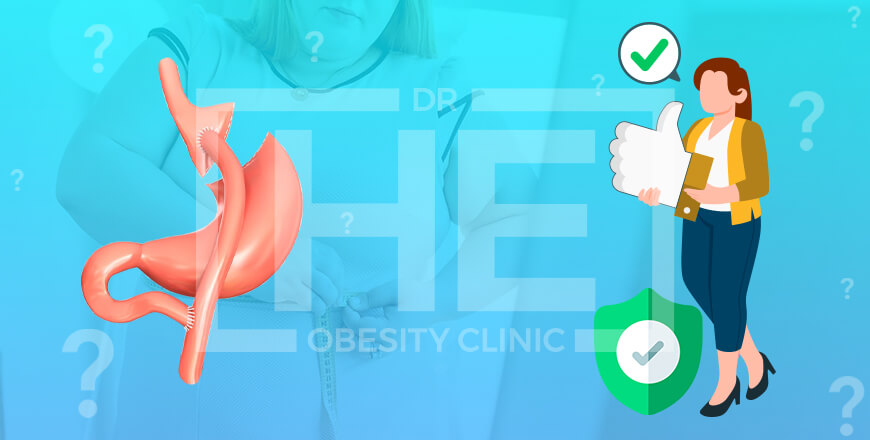
Securing a gastric bypass surgery in Turkey equates to entrusting one’s health to the hands of proficient surgeons renowned for their expertise in obesity treatment. Turkey’s medical prowess in handling intricate bariatric procedures has garnered international acclaim, offering a beacon of hope to those grappling with severe weight issues. The high standard of medical care in Turkish facilities aligns with the meticulous nature of gastric bypass, a procedure that demands precision and comprehensive post-operative monitoring to ensure patient safety and the best possible outcomes.
Gastric bypass surgery, also known as bariatric surgery, is a medical procedure that helps individuals with severe obesity to lose weight by altering the digestive system. This surgery is often recommended for individuals who have been unsuccessful in losing weight through diet and exercise, and who are at risk for serious health complications due to their obesity.
Turkey has become a popular destination for medical tourism, including bariatric surgery. The country boasts world-class medical facilities, highly trained surgeons, and affordable prices compared to many Western countries. However, when it comes to a major surgery like gastric bypass, safety is paramount. So, is having a gastric bypass in Turkey safe?
The short answer is yes, having a gastric bypass in Turkey can be safe, but it is crucial to thoroughly research and choose a reputable medical facility and experienced surgeon. Let’s delve into the factors that contribute to the safety of gastric bypass surgery in Turkey.
Quality of Medical Facilities
Turkey is home to numerous modern hospitals and clinics that are equipped with state-of-the-art technology and adhere to international standards of healthcare. Many of these facilities have received accreditation from reputable organizations, ensuring that they meet stringent quality and safety requirements.
When considering gastric bypass surgery in Turkey, it is essential to select a hospital or clinic with a proven track record of success in performing bariatric procedures. Researching the facility’s reputation, patient reviews, and success rates can provide valuable insights into the quality of care you can expect.
Expertise of Surgeons
The expertise and experience of the surgeon performing the gastric bypass procedure are critical factors in ensuring the safety and success of the surgery. In Turkey, there are highly qualified bariatric surgeons who have undergone extensive training and have a wealth of experience in performing gastric bypass and other weight loss surgeries.
Before choosing a surgeon for your gastric bypass in Turkey, it is advisable to verify their credentials, including their education, board certifications, and the number of bariatric surgeries they have performed. A skilled and experienced surgeon can significantly reduce the risks associated with gastric bypass surgery and improve the overall safety of the procedure.
Patient Care and Support
A safe gastric bypass surgery in Turkey involves comprehensive pre-operative evaluation, personalized treatment planning, and attentive post-operative care. Reputable medical facilities in Turkey prioritize patient safety and well-being by providing thorough pre-surgical assessments to determine the suitability for bariatric surgery, as well as offering ongoing support throughout the recovery process.
Additionally, many hospitals in Turkey have dedicated multidisciplinary teams that collaborate to ensure holistic care for bariatric patients. This may include nutritionists, psychologists, and physical therapists who work together to support patients before and after surgery, contributing to the overall safety and success of the procedure.
Cost-Effectiveness
One of the reasons why individuals consider having gastric bypass surgery in Turkey is the cost-effectiveness compared to many Western countries. While cost is an important consideration, it should not compromise the quality and safety of the surgical procedure. It is essential to find a balance between affordability and quality when choosing a medical facility for gastric bypass surgery in Turkey.
Before making a decision, it is advisable to obtain detailed cost estimates that encompass all aspects of the surgery, including pre-operative assessments, the surgical procedure itself, post-operative care, and any potential complications. Understanding the full financial implications will help you make an informed choice while prioritizing your safety and well-being.
Considerations for International Patients
For individuals traveling to Turkey for gastric bypass surgery, there are additional factors to consider to ensure a safe and smooth experience. This includes arranging for appropriate travel and accommodation, understanding the visa requirements for medical travel, and having a clear understanding of the communication process with the medical team before, during, and after the surgery.
Many medical facilities in Turkey offer dedicated services for international patients, including assistance with travel arrangements, language interpretation, and personalized care tailored to the specific needs of patients from abroad. These considerations contribute to the overall safety and comfort of international patients seeking gastric bypass surgery in Turkey.
Having a gastric bypass in Turkey be safe when undertaken at a reputable medical facility with experienced surgeons who prioritize patient care and safety.
Moreover, Turkey’s medical sector has seen a surge in the success rates of such surgeries, positioning the country as a leading destination for patients seeking quality and affordability. Here are some of the attributes that make Turkey a safe choice for gastric bypass surgery:
- Surgeons with extensive experience in bariatric surgery.
- Hospitals equipped with the latest medical technology.
- A track record of high success rates in obesity surgeries.
These factors combine to create a compelling argument for considering Turkey as a top option for this life-changing surgery. The assurance of safety extends beyond the operating room, with Turkey also providing a secure environment for international patients during their recovery. The confluence of professional medical care, advanced surgical practices, and a nurturing recovery environment ensures that patients not only receive the best possible treatment but also return home with satisfactory results, often exceeding their expectations. Hence, Turkey stands as a paragon of excellence in the realm of gastric bypass surgery, offering not just a procedure but a passage to renewed health and vitality.
Gastric Bypass Results
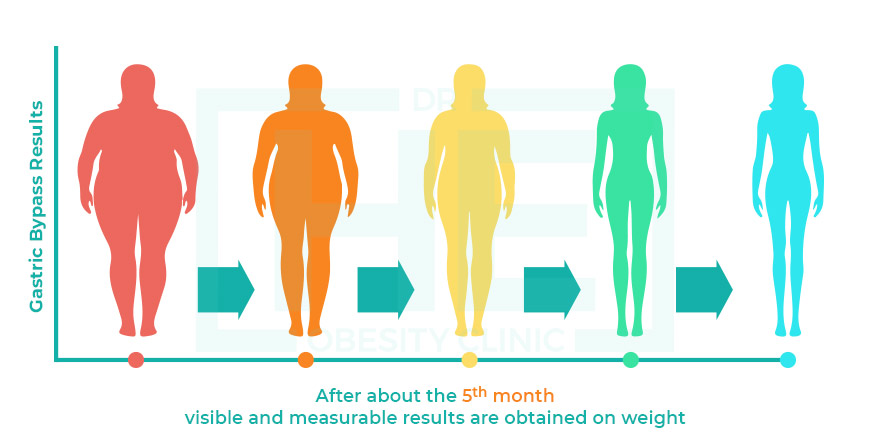
Following the meticulous post-operative dietary regimen, the initial effects of gastric bypass surgery start to take shape. The first changes are discernible in the patient’s appetite, owing to the significant reduction in stomach capacity. With the stomach resized to a mere fraction of its original volume, patients experience early satiety, often feeling full after consuming just one or two small meals. Moreover, the rearrangement of the intestines to a shortened state enhances the body’s fat-burning processes.
As time progresses, by approximately the fifth month post-surgery, tangible weight loss becomes evident. The patient’s journey toward a healthier weight is typically gradual, with the potential for ongoing weight reduction extending up to five years. During this period, the body undergoes a remarkable transformation, which is not only visible but also quantifiable.
In the months following surgery, patients often witness:
- A decrease in appetite.
- A new dietary pattern of smaller, more frequent meals.
- Incremental weight loss, becoming more noticeable with time.
Eventually, as the intestines adapt, their capacity to handle a larger volume of food increases. This adaptation may lead to a moderate resurgence in weight if dietary discipline is not maintained. Therefore, sustaining weight loss is contingent upon long-term nutritional habits and lifestyle adjustments. The surgery serves as a catalyst for weight loss, but the enduring success hinges on the individual’s commitment to a transformed way of life that supports their new physiological state.
Why Should Not Trust Gastric Bypass Surgery Reviews on Forums?
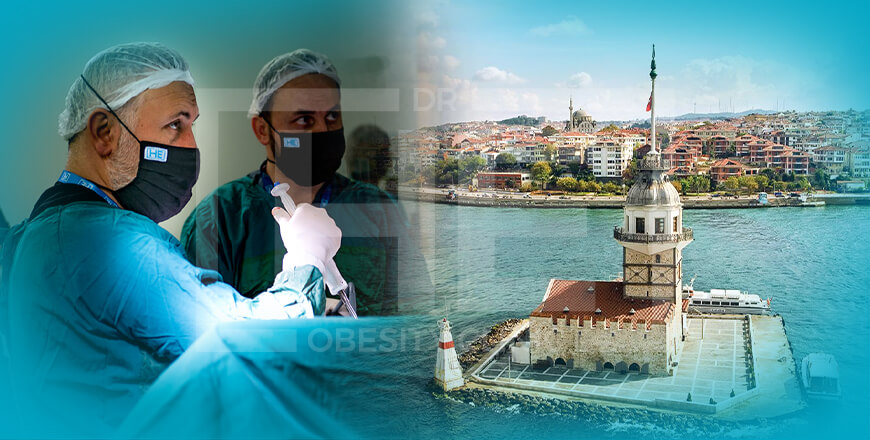
Embarking on the journey of gastric bypass surgery requires thorough research and consideration, particularly when it comes to choosing the right clinic. Istanbul stands out as a trusted destination for this life-changing procedure, offering state-of-the-art medical facilities. One should exercise caution and look beyond the surface of online forums, which may harbor biased or commercially driven testimonials.
- Seek out authenticated case studies.
- Consider the credibility of the source.
- Evaluate the transparency of patient experiences.
Individuals should prioritize credible sources like YouTube, where visual documentation of patient stories provides a clearer picture of the outcomes and experiences. This platform allows viewers to witness the transformation first-hand, granting a more genuine insight into the procedure’s impact.
Moreover, reviews of gastric bypass surgery in Turkey often reflect positive outcomes, painting a picture of satisfaction and improved health post-surgery. These accounts are valuable for those considering the procedure, as they offer a glimpse into the potential benefits and successes. However, the discerning individual understands the importance of critical evaluation, recognizing that not all reviews are created equal.
The well-informed approach involves a careful analysis of multiple sources, seeking out real-life stories and verified information. Istanbul’s reputation in the field of bariatric surgery has been built upon a foundation of successful procedures and transparent sharing of patient experiences. These narratives serve as a beacon for potential patients, guiding them towards making an informed decision in their pursuit of health and well-being.
The Cost of Gastric Bypass in UK, USA and Canada
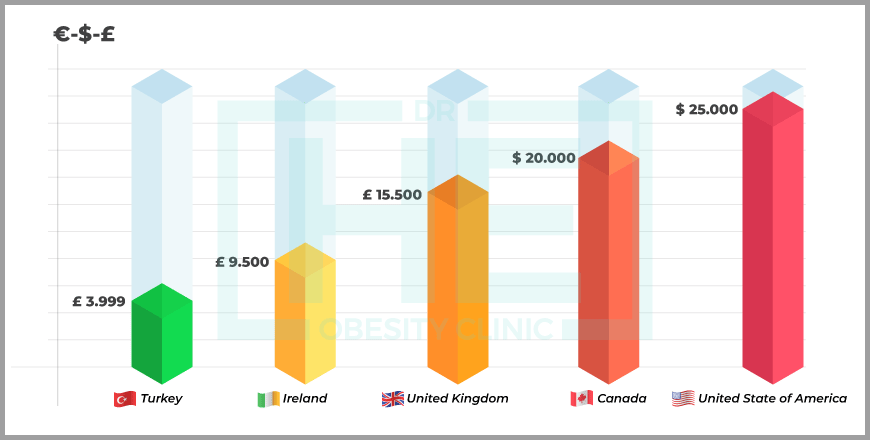
Navigating the financial aspect of gastric bypass surgery reveals a stark contrast in pricing between various regions. In the realm of medical tourism, Turkey stands out for its cost-effective options. While the UK and Ireland present figures that oscillate between £9,500 and £15,500, the financial burden climbs even higher across the Atlantic. The United States and Canada see averages pushing to the tune of $20,000 to $25,000, putting a significant strain on those seeking this life-changing surgery.
- In the UK: £9,500 – £15,500
- In the USA/Canada: Approximately $20,000 – $25,000
- In Turkey: £3,999 (all-inclusive package)
Nevertheless, Turkey offers a more economical alternative without compromising on the quality of care. The all-inclusive package price of £3,999 encompasses not only the surgical procedure but also the ancillary costs that often accompany medical treatments abroad. This price, while subject to variation among different clinics, remains markedly lower than its Western counterparts. Furthermore, the standards of the procedure maintain an international caliber, mirroring the protocols followed in the UK, the USA, and Canada.
This affordability paired with high standards positions Turkey as an attractive destination for those pursuing gastric bypass surgery. Patients can access the same advanced surgical techniques and aftercare services for a fraction of the cost. This cost disparity has fueled Turkey’s rise as a preferred destination for bariatric procedures, providing substantial financial relief without sacrificing the quality of medical care. Such economic advantage, alongside the promise of transformative results, continues to draw a global clientele to Turkish medical facilities.
How much does Gastric Bypass surgery cost in Turkey?
How much does gastric bypass surgery cost in Turkey? The affordability of gastric bypass surgery in Turkey, specifically at Dr. Hasan Erdem Obesity Clinic in Istanbul, stands out on the global stage. Here, the cost is substantially lower than in the UK and USA, positioning Turkey as a financially viable destination for this life-changing procedure. How much is gastric bypass surgery in Turkey? The clinic in Istanbul offers the surgery for approximately $4,700 or £4,000, in stark contrast to the $25,000 or £15,500 price tag often found in Western countries.
Moreover, the comprehensive care packages provided by Turkish medical facilities enhance the value proposition for international patients. These packages typically include:
- Airport transfer services ensuring seamless travel logistics.
- Translation services to bridge communication gaps.
- Personalized after-care support, tailoring the recovery process to each individual’s needs.
Additionally, patients benefit from the extensive experience of Turkish surgeons who perform these procedures with a commitment to international medical standards. The lower cost does not compromise the quality of care, as Turkey’s medical services are on par with global expectations. This cost-effectiveness combined with high-quality service explains the steady influx of patients choosing Turkey for their gastric bypass surgery.
The Dr. Hasan Erdem Obesity Clinic not only offers a monetary advantage but also the assurance of a supportive postoperative journey. This holistic approach to patient care contributes significantly to the successful outcomes reported by those who have undergone the surgery at the clinic. The blend of affordability, quality, and comprehensive care solidifies Turkey’s position as a leading choice for those seeking gastric bypass surgery.
Gastric Bypass Surgery All Inclusive Packages in Turkey
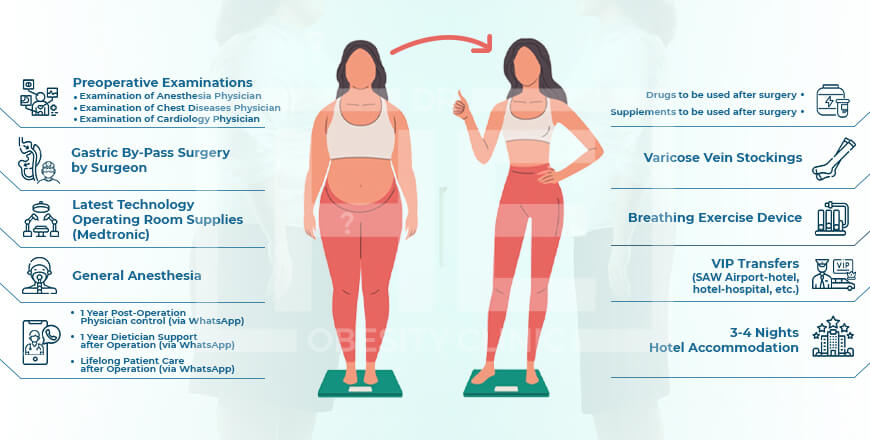
- Preoperative Examinations
- Examination of Anesthesia Physician
- Examination of Chest Diseases Physician
- Examination of Cardiology Physician
- Gastric By-Pass Surgery by Surgeon
- Latest Technology Operating Room Supplies (Medtronic)
- General Anesthesia
- 1 Year Post-Operation Physician control (via WhatsApp)
- 1 Year Dietician Support after Operation (via WhatsApp)
- Lifelong Patient Care after Operation (via WhatsApp)
- Drugs to be used after surgery
- Supplements to be used after surgery
- Varicose Vein Stockings
- Breathing Exercise Device
- VIP Transfers (SAW Airport-hotel, hotel-hospital, etc.)
- 3-4 Nights Hotel Accommodation
Gastric Bypass Reviews in Turkey
Gastric bypass surgery stands as a beacon of hope for many battling obesity in Turkey, boasting a high satisfaction rate among patients. Reviews consistently reflect a trend of substantial weight loss, fostering a renewed zest for life in individuals who have chosen this path. Alongside shedding pounds, patients often experience a noteworthy decline in obesity-linked ailments, such as diabetes and hypertension. This positive shift in health dynamics speaks volumes about the efficacy of the procedure.
The surgical expertise in Turkey garners commendation, with numerous testimonials extolling the proficiency of Turkish surgeons. These medical professionals are renowned for their mastery in performing gastric bypass, which is evident in the minimal discomfort patients encounter post-surgery. Moreover, the swift recovery that follows is a testament to the advanced techniques employed.
Patients frequently acknowledge the attentive and empathetic care provided by the medical teams in Turkey. The nurturing environment contributes greatly to the healing process, ensuring a comfortable convalescence.
The following points encapsulate the key benefits reported by patients:
- Marked reduction in body weight
- Improvement in quality of life
- Decrease in symptoms of obesity-related conditions
In summary, the collective experiences of those who have undergone gastric bypass in Turkey paint a picture of a medical journey marked by expertise, care, and significant health benefits. These narratives forge a compelling endorsement of the procedure and the medical infrastructure of Turkey.

